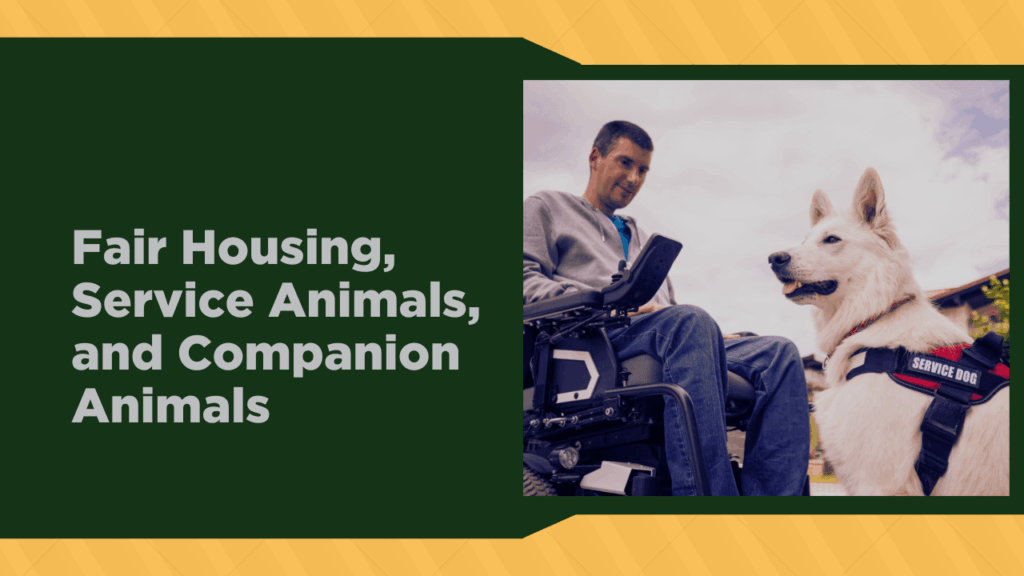
Fair housing is a big topic, and if you often feel overwhelmed with the requirements, the protected classes, and the potential for liability and easy legal mistakes, you’re not alone. Understanding these nuanced laws is a challenge for many rental property owners.
And it highlights the need for good information and reliable professional support.
We’re going to talk about fair housing and what the laws look like now, and we’re going to shine a spotlight specifically on the area of the law that deals with service animals and companion animals. This is where so many owners get especially confused.
Here’s what you need to know about fair housing and specifically those animals that are not legally pets.
Fair Housing Laws – Federal and State
At the foundation of all federal and state laws around fair housing are a set of protected classes. The federal Fair Housing Act, which has been around for 57 years, establishes seven protected classes, and the state list includes even more protected classes in housing protections.
Federal and state laws identify the following protected classes:
- Race
- Color
- Religion
- Sex (updated language over the last few years includes gender identity and sexual orientation)
- Disability
- National origin
- Familial status
It’s unlawful to discriminate against people based on any of those characteristics. In a practical sense, this means that as a landlord you cannot deny an otherwise qualified application because a tenant has children or was born in another country. You cannot say no to a tenant with a wheelchair and you cannot say you’re renting only to men.
Colorado fair housing laws go even further, and this should surprise no one. Did you know that this state was the first to pass fair housing laws at the state level? Colorado came up with its own fair housing laws in 1959, nearly a decade before the federal Fair Housing Act was signed into law.
That’s more than trivia, it’s a foundation upon which state fair housing laws bypass federal laws when it comes to protected classes. In Colorado, you cannot discriminate against a potential tenant or an existing tenant based on disability, race, creed, color, religion, sex, sexual orientation, marital status, familial status, national origin, ancestry, source of income, or hairstyle.
Landlords interested in staying on the right side of fair housing laws will treat every applicant and tenant consistently.
Most legal mistakes are made during the marketing and screening processes. You cannot, for example, ask certain questions during the showing or screening process. You are not allowed to ask potential renters how many kids they have or whether they have a disability. You cannot ask how old they are or “where they come from.”
Standard rental criteria, objective and automated screening systems, and ongoing documentation will help you remain compliant with fair housing laws. Working with a property management expert who understands Colorado’s rental laws will also ensure you’re protected from easy mistakes and extra liability.
Service Animals and Fair Housing Laws
According to the Civil Rights Division of the U.S. Department of Justice, service animals are defined as dogs that are individually trained to do work or perform tasks for people with disabilities.
For the purposes of property management and leasing, only dogs can be service animals. Miniature horses can also be considered service animals, but only under very specific circumstances which would not normally apply to a tenant in a rental home. You should expect that any service animal would be a dog.
Service animals must be individually trained to do specific work, or perform tasks for people with physical, mental, or emotional disabilities. The work or task an animal has been trained to provide must be directly related to the person’s disability.
What are some of these tasks that they’re trained to do?
- Guiding people who are blind, both inside and outside of the home
- Alerting people who are deaf to potential dangers
- Pulling a wheelchair for someone who cannot push it themselves
- Protecting a person who is having a seizure
- Reminding a person with mental illness to take prescribed medications
- Soothing a person with Post Traumatic Stress Disorder (PTSD) during an anxiety attack
There are other duties a service animal may perform, depending on the person and the disability.
Companion Animals and Fair Housing Laws
Service dogs are often easy to identify. They’re sometimes wearing a fabric sheet or scarf that explains what they are and why they are in a place where one would not normally find a pet. Companion animals and support animals are not so easily identified. They don’t have to be dogs, either. They can be cats or snakes or any kind of animal.
An emotional support animal is not a service animal, but it’s also not a pet. An emotional support animal is a companion animal that provides therapeutic benefits to an individual with an intellectual, emotional, or psychiatric disability.
If you have a tenant who is seeking a companion animal, that tenant must have a verifiable disability. This type of animal is considered a “reasonable accommodation” under the Fair Housing Amendments Act of 1988. It explains why the animal is not considered a pet, and why you must allow that animal if you don’t allow pets in your rental home.
The United States Department of Housing and Urban Development (HUD) uses the term “assistance animal” to cover any animal that works, provides assistance, or performs tasks for the benefit of a person with a disability, or provides emotional support that alleviates one or more identified symptoms or effects of a person’s disability.
Fair Housing and Animals: What You Can and Cannot Do
Understanding and complying with the boundaries around fair housing laws, specifically those pertaining to service animals and companion animals, is not always easy. Here is a glimpse at what is permitted and what is prohibited.
- You Can Ask for Details When a Tenant Requests a Companion Animal
While service animals are often easy to understand, companion animals can be a bit tricky. Rental property owners are permitted to ask reasonable questions and to require medical documentation. But, it’s not easy to talk about a person’s disability, so the conversation you have with tenants or applicants might feel uncomfortable. You don’t want to violate fair housing laws by asking about their physical and mental health, and people are entitled to their privacy.
That awareness has to be balanced with your desire to protect your investment property. You want to avoid being taken advantage of by someone who is potentially trying to make a pet look like a service animal.
As long as you are respectful and operating within the confines of the law, you should feel free to ask a few elemental questions. Legally, you can ask tenants if their companion animal is necessary for them to use and enjoy the housing unit that they’ve applied for or that they’re currently living in. You cannot ask a tenant who needs a service animal for documentation that they need the animal (it’s usually obvious, and service animals are identified as such), but you can ask for documentation from a professional in the medical field when a tenant wants to move in with an emotional support animal.
- You Cannot Charge Pet Fees or Deposits
If you’re wondering whether you can charge a deposit or a fee for a tenant who needs a service animal or an emotional support animal – you cannot. You also cannot restrict breeds and you cannot require that the companion animal be a certain size.
A service animal is not a pet. Neither is a companion animal. Therefore, those animals will not be subject to any of your pet rules and fees.
There’s always risk, of course. What if a tenant’s service animal chews holes in your walls or leaves damage that goes beyond normal wear and tear? What if the odor of urine is impossible to remove from the carpets and floorboards?
That’s actually the tenant’s responsibility. You can cover that damage out of the security deposit that you collect from your tenant. Make sure you document the damage carefully in case there is a dispute.
Navigating fair housing laws, especially around service and companion animals, can be complex, but understanding your responsibilities as a Colorado landlord is essential to staying compliant and creating an inclusive rental environment. Remember, service animals and companion animals such as emotional support animals (ESAs) are not considered pets under federal and state housing laws. They are legally protected accommodations for individuals with disabilities.
 Remember, too, that you’re responsible for treating every tenant, every application, and every showing in a way that’s consistent and objective, and not based on your feelings about a protected class. When you deny an application for your property, make sure the reason is lawful and well-documented.
Remember, too, that you’re responsible for treating every tenant, every application, and every showing in a way that’s consistent and objective, and not based on your feelings about a protected class. When you deny an application for your property, make sure the reason is lawful and well-documented.
Staying informed and keeping communication respectful and transparent with prospective and current tenants not only helps you comply with the law, it also builds trust and reduces risk.
We’re committed to keeping the homes we rent inclusive and accessible. If you have any questions around fair housing, please don’t hesitate to contact us at Muldoon Associates.
